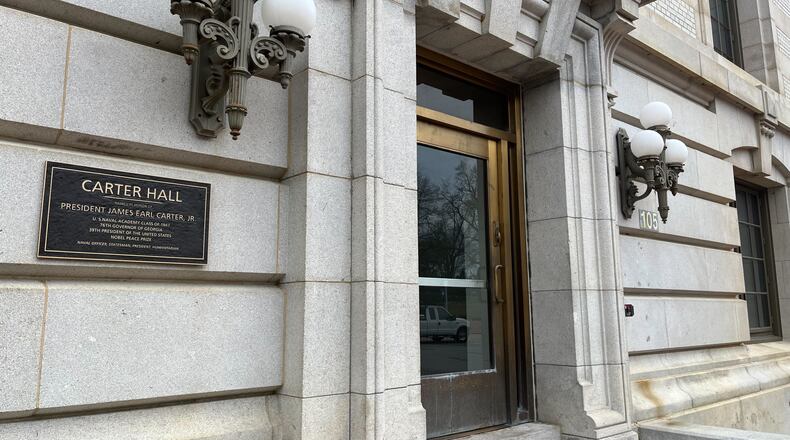ANNAPOLIS, Md. — On the campus of the U.S. Naval Academy, families and Boy Scouts spent Presidents Day touring the school’s historic buildings and majestic chapel. The last stop of the official tour is an obelisk at the center of campus where first-year midshipmen will soon celebrate being “plebes no more.”
It is an institution steeped in history where most of the students still reside in a single dormitory: Bancroft Hall. And on the main floor of that building is a tribute to one of its most famous alums, former President Jimmy Carter.
Carol and Greg Gifford had traveled from their home outside of Washington to meet up with their son and his family for an official tour of the campus. They had seen the portraits of Carter and reflected on his ties to the institution.
Over the weekend, the Carter Center had announced that the former president decided to forgo further medical treatments and enter hospice. Now, the Giffords said, it also is a time to think about what Carter means to the country.
“They’ve given the ultimate service, in a sense, of directing our country in many different trials and situations,” Carol Gifford said. “And given up their personal life to be able to serve the United States of America.”
In Bancroft Hall, beneath the photo of Carter the midshipmen and another of Carter the president, is a short biography that traces his life, including an early graduation from the academy in 1946, an acceleration caused by the war. Carter went to work on the Navy’s first nuclear submarines, and because of his expertise he was sent to Canada in 1952 to respond to a nuclear reactor meltdown, The Washington Post reported.
But the former midshipman from rural Georgia would have just a short career on active duty.
Carter resigned in 1953 to take over the family’s peanut business after his father died, although he would remain a reservist for several more years. That change set the course for a political career that started in the Georgia Senate and continued to the governor’s office and eventually the White House.
A short walk from Bancroft Hall but on a quieter side of the campus is a building that for decades carried the name of a naval oceanographer who resigned his commission to join the Confederacy. Just recently, that building was renamed in tribute to Carter.
Carter Hall is now marked with a brand-new plaque at its door and a sign on the lawn with shiny gold letters. It’s not a stop on the campus tour, and since no classes were held on Presidents Day the building was quiet.
Jim Taggart, a Navy veteran from Levittown, N.Y., decided to spend the holiday checking out the campus for the first time. He toured the dining hall and stopped by the gift shop to purchase a sweatshirt.
Taggart remembers when Carter was president and the controversy he faced during the Iran hostage crisis. And then Carter embarked on a post-presidency highlighted by work for Habitat for Humanity and other philanthropic endeavors.
“It’s a period to look back and see his presidency, and his time serving his country as a naval officer, and his time after being president,” Taggart said. “What he did to make the world a better place.”
About the Author
Keep Reading
The Latest
Featured



